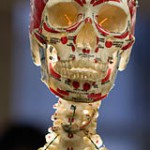Tag Health & medicine
Sweeping analysis of research reinforces media influence on women’s body image
As France's parliament considers a landmark bill that would outlaw media images glamorizing the extremely thin, psychology researchers are reporting some of the most definitive findings yet on how these images affect women.
Wisconsin biomedical engineering students design meaningful medical solutions
When University of Wisconsin–Madison junior Claire Flanagan graduates in May 2009 with bachelor's degrees in biomedical engineering (BME) and biochemistry, she might display her diploma next to an equally prestigious document: a patent from the U.S. Patent and Trademark Office.
UW study shows pomegranate juice may help fight lung cancer
Researchers are adding to the list of cancer types for which pomegranates seem to halt growth. A recent study at the University of Wisconsin–Madison using a mouse model shows that consuming pomegranates could potentially help reduce the growth and spread of lung cancer cells or even prevent lung cancer from developing.
Curiosities: Why do we dream?
Submitted by Rachel Furlow, 7th grade, Cherokee Middle School
Campus influenza cases on the rise
Since the beginning of February, there has been a marked increase in the number of students coming to University Health Services (UHS) at the University of Wisconsin–Madison with influenza-like illness and laboratory-confirmed influenza.
Unique whey protein is promising supplement for strict PKU diet
Individuals with a rare genetic condition known as phenylketonuria, or PKU, receive a difficult-to-follow prescription. They must severely limit their consumption of protein, completely avoiding mealtime staples such as meat, cheese and even bread. Not surprisingly, for many, diet is a constant struggle.
Bioethicist Fost debates use of steroids in sports
Norman Fost, professor in the departments of pediatrics and medical history and bioethics, and director of the Program in Bioethics, particpiated recently in an Intelligence Squared U.S. debate as an advocate for the motion “Should We Accept Steroid Use in Sports?”
Ebola virus disarmed by excising a single gene
The deadly Ebola virus, an emerging public health concern in Africa and a potential biological weapon, ranks among the most feared of exotic pathogens.
Study: Brain connections strengthen during waking hours, weaken during sleep
Most people know it from experience: After so many hours of being awake, your brain feels unable to absorb any more-and several hours of sleep will refresh it.
ACTION campaign recruits more than 450 treatment agencies
Since its launch in October 2007, the ACTION Campaign affiliated with the University of Wisconsin–Madison and other national groups has already recruited more than 450 agencies to implement one of several simple changes in addiction treatment operations.
Genome study places modern humans in the evolutionary fast lane
Countering a common theory that human evolution has slowed to a crawl or even stopped in modern humans, a new study by UW–Madison researchers examining data from an international genomics project describes the past 40,000 years as a time of supercharged evolutionary change.
Katen-Bahensky named president and CEO of UW Hospital and Clinics
Donna Katen-Bahensky, CEO at University of Iowa Hospitals and Clinics and senior associate vice president for medical affairs at University of Iowa Health Care since 2002, has been named president and CEO of University of Wisconsin Hospital and Clinics. She will join the hospital effective Feb. 4, 2008.
Waistline growth on high-carb diets linked to liver gene
Experts have been warning for years that foods loaded with high-fructose corn syrup and other processed carbohydrates are making us fatter. Now, a University of Wisconsin–Madison study has uncovered the genetic basis for why this is so.
UW-Madison scientists guide human skin cells to embryonic state
In a paper to be published Nov. 22 in the online edition of the journal Science, a team of University of Wisconsin–Madison researchers reports the genetic reprogramming of human skin cells to create cells indistinguishable from embryonic stem cells.
Health toll of climate change seen as ethical crisis
The public health costs of global climate change are likely to be the greatest in those parts of the world that have contributed least to the problem, posing a significant ethical dilemma for the developed world, according to a new study.
Recent sightings: Anatomy, labeled
Medical terminology identifies the features of a human skull on a teaching skeleton during a gross anatomy class lab in the Medical…
Panels examine intersection of science, religion and contemplative practice
The study of the human mind and how the worlds of science, religion and contemplative practice intersect will be explored during two panel discussions in November.
UW center will lead efforts to expand farm-to-school programs in Midwest
The Center for Integrated Agricultural Systems at the University of Wisconsin–Madison has been named as lead agency in a six-state area for a new national program to encourage schools to serve more locally grown food.












